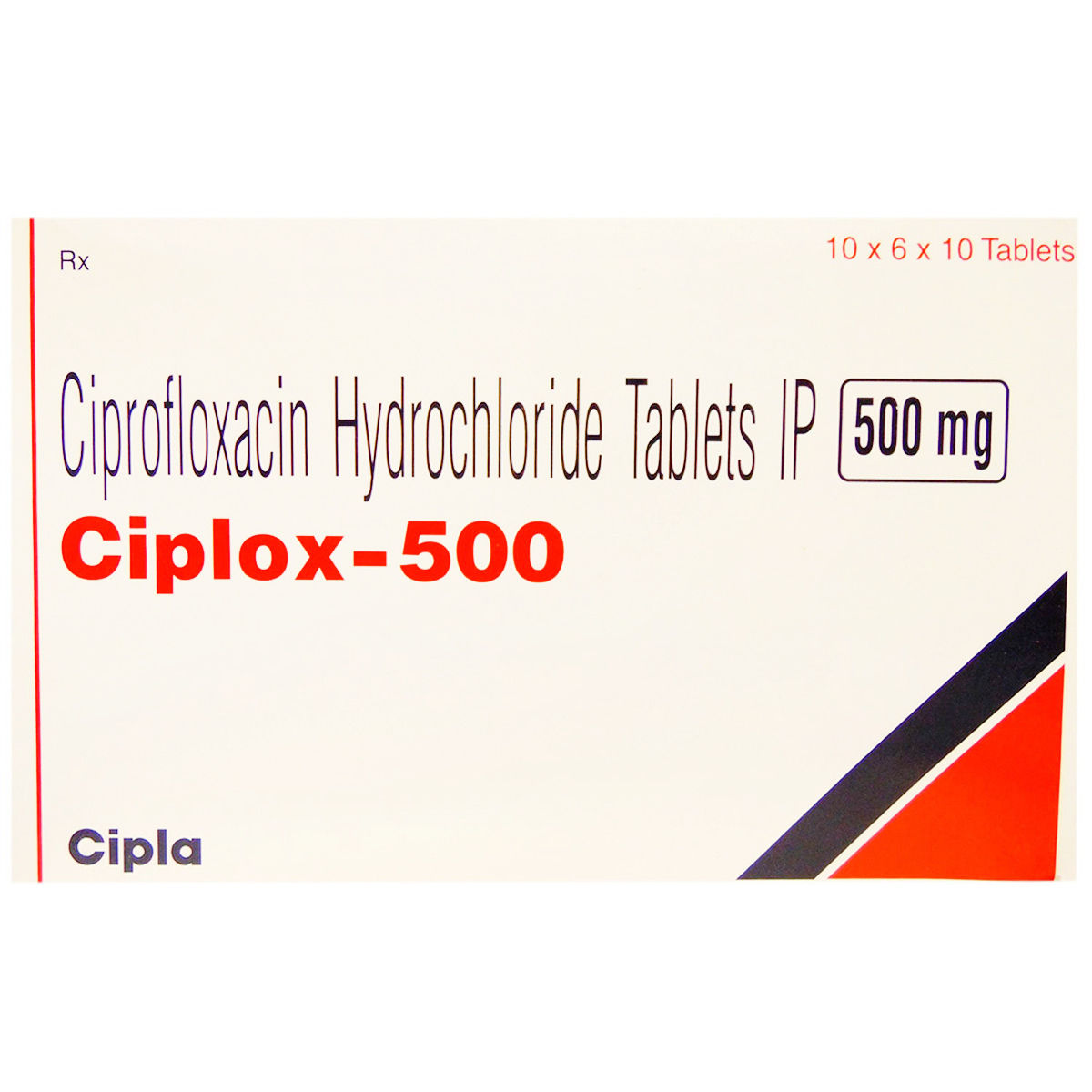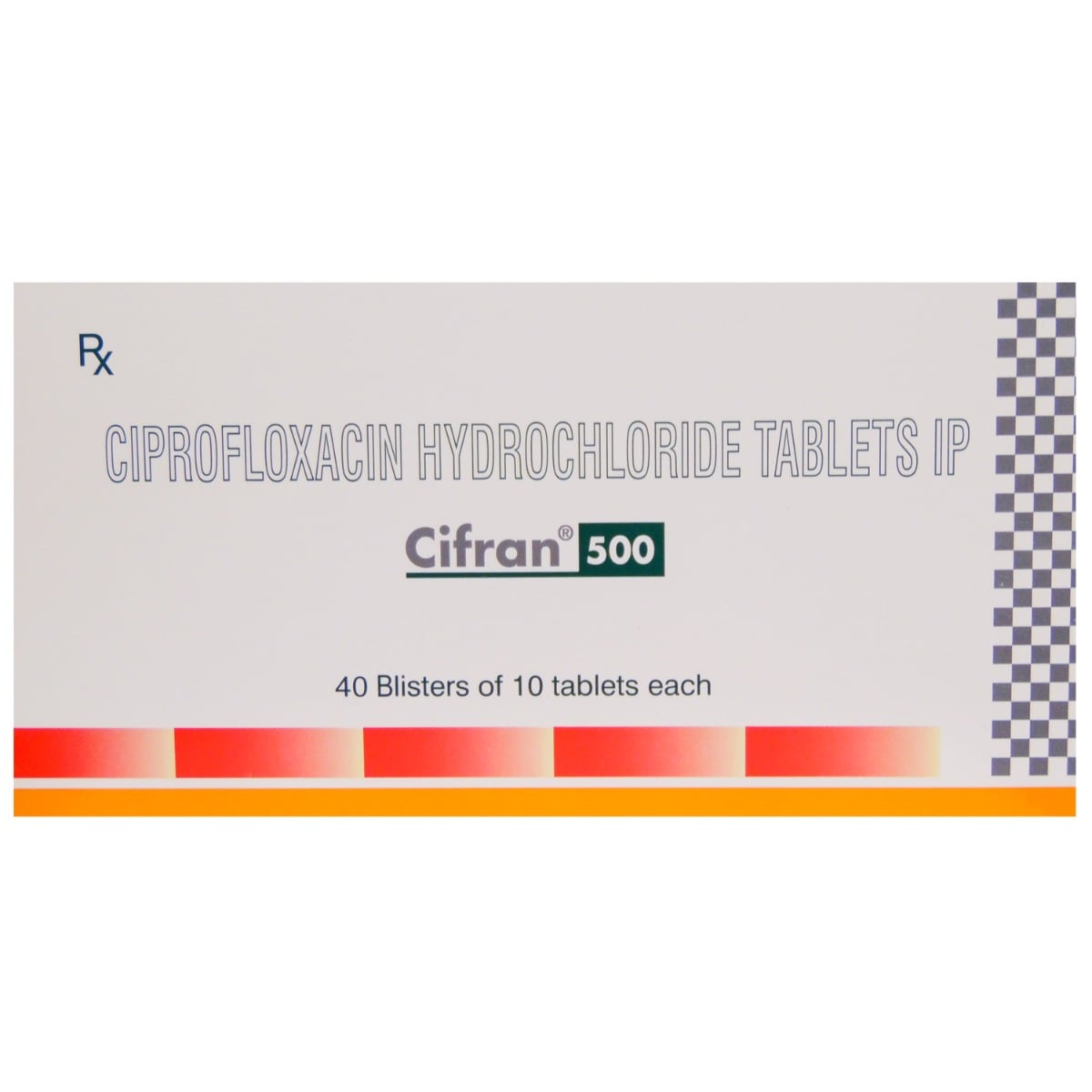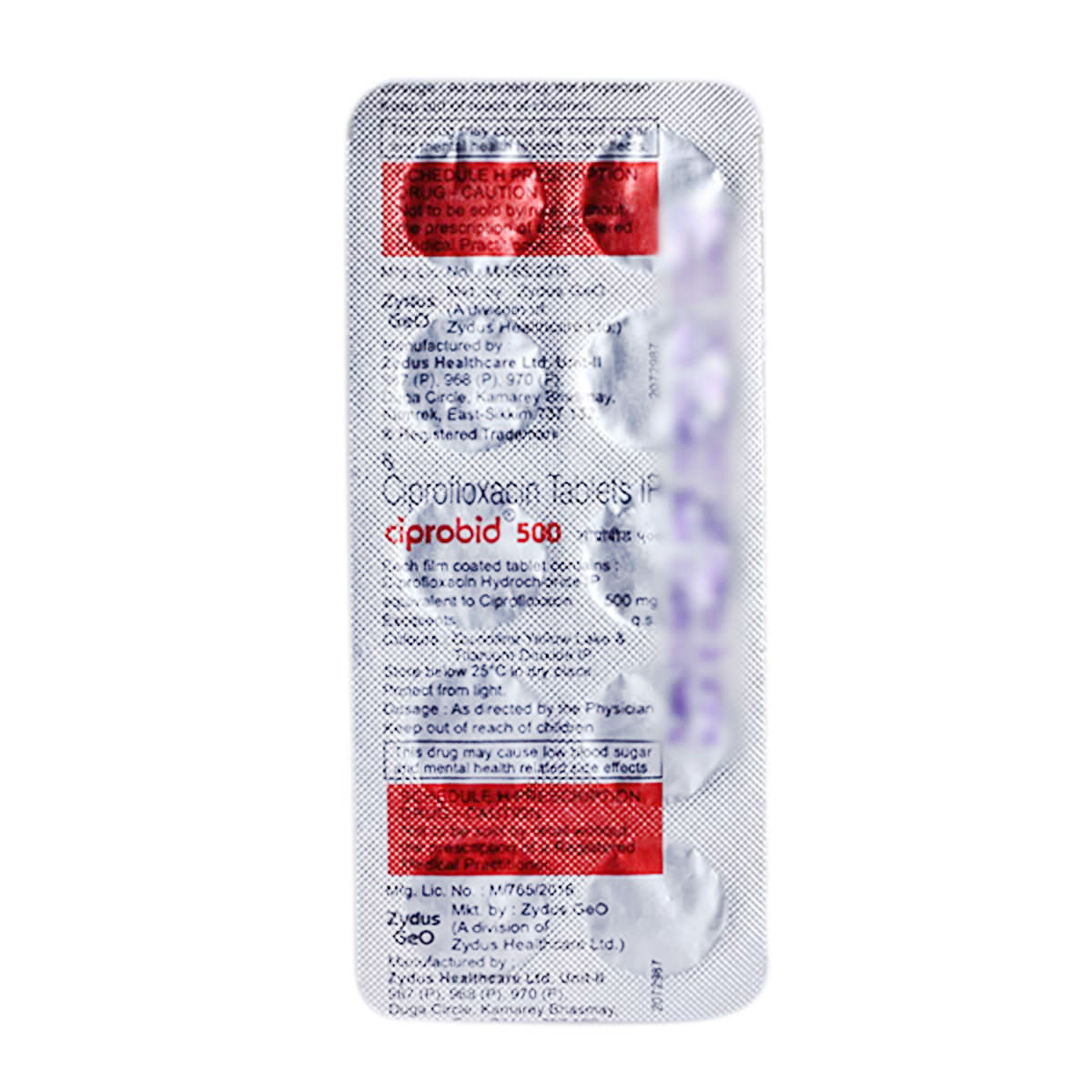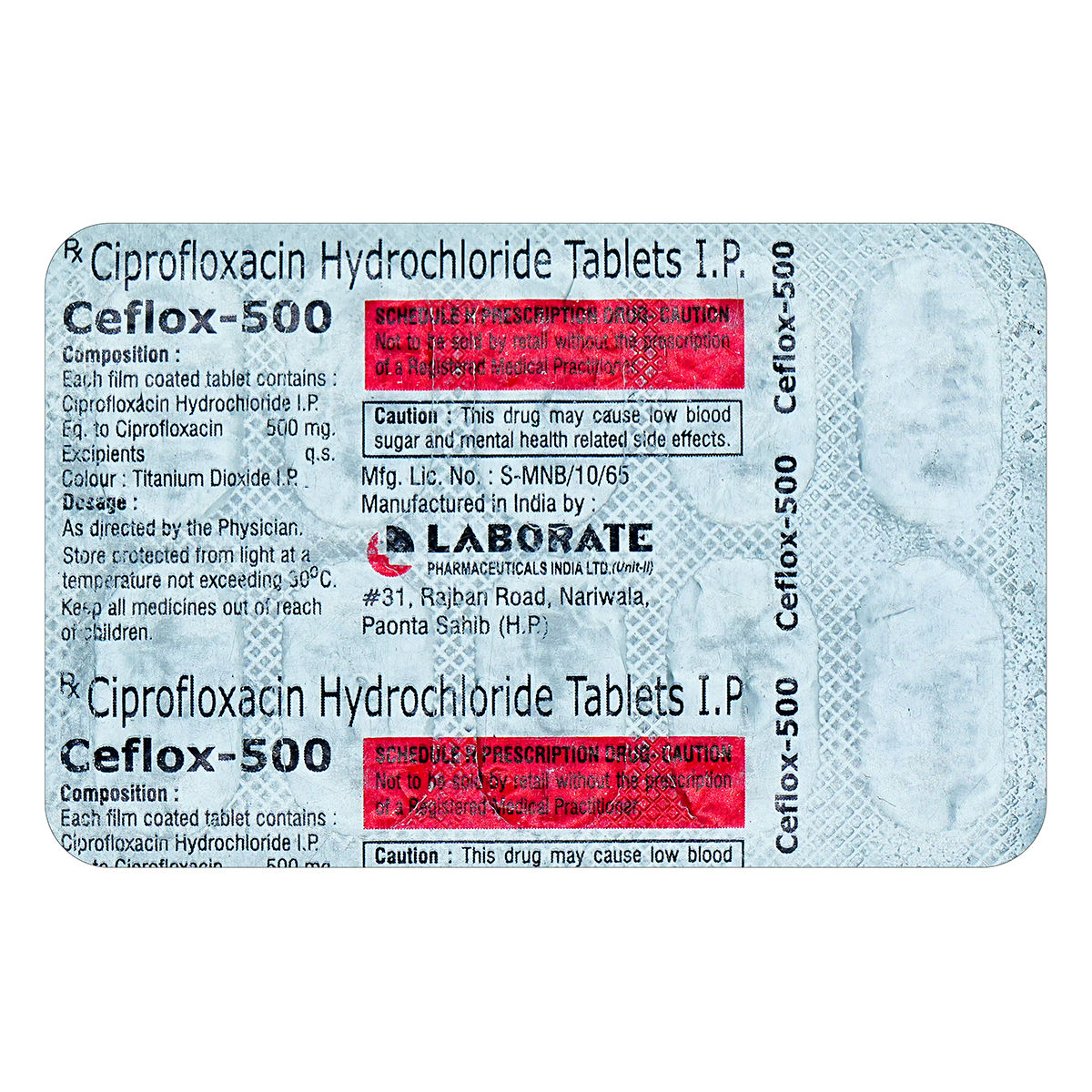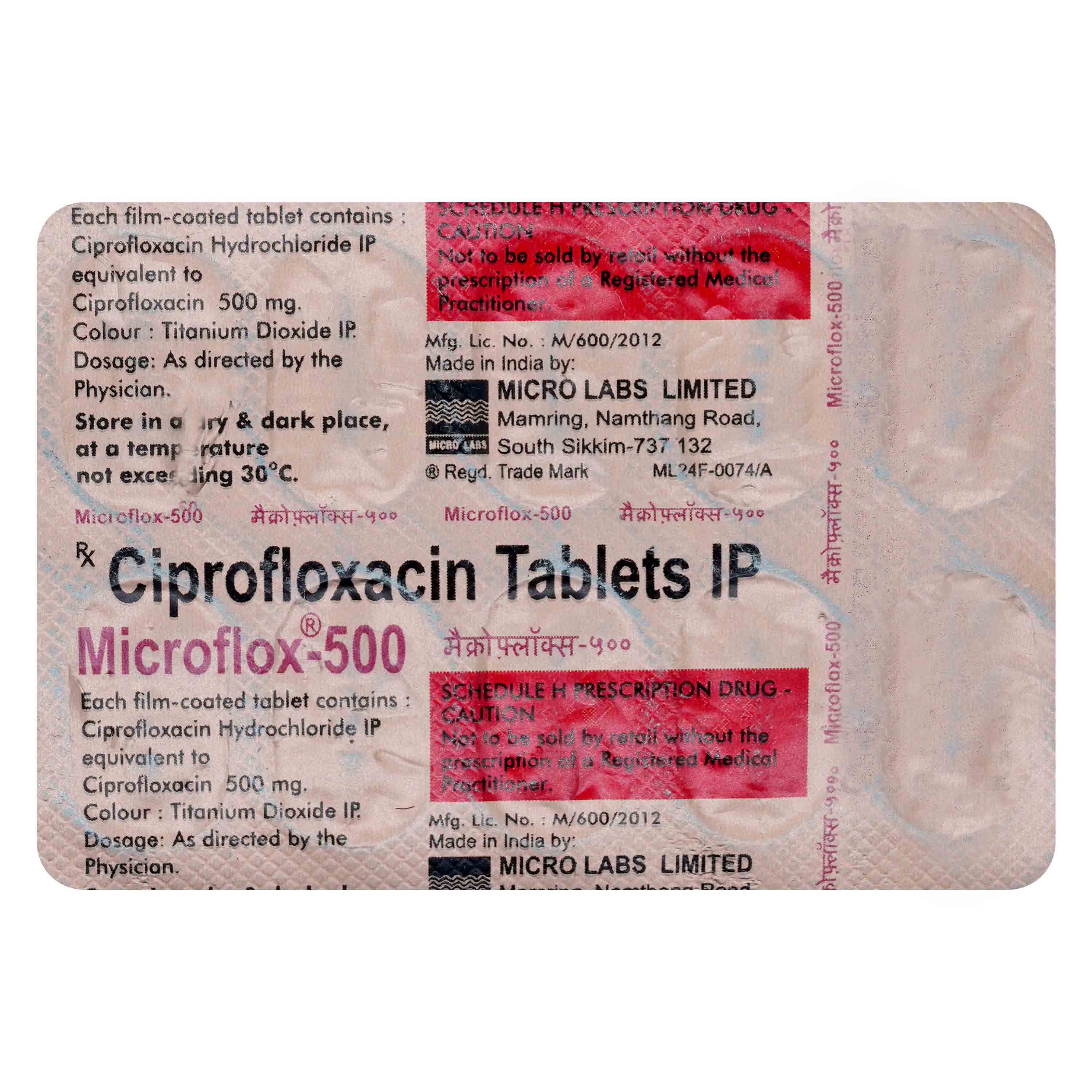Ciprofloxacin 500 mg Tablet 10's

₹47.25*
MRP ₹52.5
10% off
₹44.62*
MRP ₹52.5
15% CB
₹7.88 cashback(15%)
Free Delivery
With Circle membership
(Inclusive of all Taxes)
This offer price is valid on orders above ₹800. Apply coupon PHARMA10/PHARMA18 (excluding restricted items)
Ciprofloxacin 500 mg Tablet is used to treat certain bacterial infections in children. It is prescribed for the treatment of Bronchopulmonary infections due to Pseudomonas aeruginosa in patients with cystic fibrosis, Complicated urinary tract infections, acute pyelonephritis, and Inhalation anthrax (post-exposure prophylaxis and curative treatment). Ciprofloxacin 500 mg Tablet may also be used to treat severe infections in children when necessary. Treatment should be initiated only by physicians experienced in treating cystic fibrosis and/or severe infections in children.
Know Your Delivery Time
Provide Delivery Location
 Prescription drug
Prescription drugWhats That

Secure Payment

India's Most Trusted Pharmacy

Genuine Products
Composition :
Manufacturer/Marketer :
Consume Type :
Return Policy :
Expires on or after :
NPPA :
About Ciprofloxacin 500 mg Tablet
Ciprofloxacin 500 mg Tablet belongs to the class of antibiotic medication primarily used to treat certain infections caused by bacteria in children. Bacterial infections refer to any illness or condition caused by bacterial growth or toxins.
Ciprofloxacin 500 mg Tablet contains an antibiotic, 'Ciprofloxacin', which is bactericidal in nature and kills bacteria that cause infections. Thus, it helps to treat various bacterial infections effectively.
Ciprofloxacin 500 mg Tablet is for paediatric use only. Give Ciprofloxacin 500 mg Tablet to children as advised by the doctor. In rare cases, Ciprofloxacin 500 mg Tablet may cause side effects such as nausea, diarrhoea, vomiting, headache, dizziness, abdominal pains, dyspepsia, flatulence and musculoskeletal pain. Most of these side effects of Ciprofloxacin 500 mg Tablet do not require medical attention and gradually resolve over time. However, if these side effects persist or worsen, please consult your doctor.
Before using the Ciprofloxacin 500 mg Tablet , please inform your doctor of your children's or caregiver's medical conditions, sensitivities, and all drugs they are taking. Continue using Ciprofloxacin 500 mg Tablet for as long as your doctor has prescribed to treat your child's illness effectively. Do not use any other medications or supplements while using Ciprofloxacin 500 mg Tablet unless recommended by the doctor.
Uses of Ciprofloxacin 500 mg Tablet
Directions for Use
Medicinal Benefits
Ciprofloxacin 500 mg Tablet contains the antibiotic Ciprofloxacin, which helps treat a wide range of bacterial infections in children. It can also be used to treat severe infections in children. It is bactericidal in nature and works by killing bacteria that cause infections. It prevents the division of bacterial cells and inhibits the repair of bacterial cells. Both these actions lead to the killing of the bacteria.
How Ciprofloxacin 500 mg Tablet Works
Storage
- Inform your doctor about the nausea and discuss possible alternatives to the medication or adjustments to the dosage.
- Divide your daily food intake into smaller, more frequent meals to reduce nausea.
- Opt for bland, easily digestible foods like crackers, toast, plain rice, bananas, and applesauce.
- Avoid certain foods that can trigger nausea, such as fatty, greasy, spicy, and smelly foods.
- Drink plenty of fluids, such as water, clear broth, or electrolyte-rich beverages like coconut water or sports drinks.
- Use ginger (tea, ale, or candies) to help relieve nausea.
- Get adequate rest and also avoid strenuous activities that can worsen nausea.
- Talk to your doctor about taking anti-nausea medication if your nausea is severe.
- Record when your nausea occurs, what triggers it, and what provides relief to help you identify patterns and manage your symptoms more effectively.
- Inform Your Doctor: Notify your doctor immediately about your diarrhoea symptoms. This allows them to adjust your medication or provide guidance on managing side effects.
- Stay Hydrated: Drink plenty of fluids to replace lost water and electrolytes. Choose water, clear broth, and electrolyte-rich drinks. Avoid carbonated or caffeinated beverages to effectively rehydrate your body.
- Follow a Bland Diet: Eat easy-to-digest foods to help firm up your stool and settle your stomach. Try incorporating bananas, rice, applesauce, toast, plain crackers, and boiled vegetables into your diet.
- Avoid Trigger Foods: Steer clear of foods that can worsen diarrhoea, such as spicy, fatty, or greasy foods, high-fibre foods, and dairy products (especially if you're lactose intolerant).
- Practice Good Hygiene: Maintain good hygiene to prevent the spread of infection. To stay healthy, wash your hands frequently, clean and disinfect surfaces regularly, and avoid exchanging personal belongings with others.
- Take Anti-Diarrheal Medications: If your doctor advises, anti-diarrheal medications such as loperamide might help manage diarrhoea symptoms. Always follow your doctor's directions.
- Keep track of your diarrhoea symptoms. If they don't get better or worse or are accompanied by severe stomach pain, blood, or dehydration signs (like extreme thirst or dark urine), seek medical help.
- Preventing Vomiting (Before it Happens)
- Take medication exactly as prescribed by your doctor. This can help minimize side effects, including vomiting.
- Having a small meal before taking your medication can help reduce nausea and vomiting.
- Talk to your doctor about taking anti-nausea medication along with your prescribed medication.
- Managing Vomiting (If it Happens)
- Try taking ginger in the form of tea, ale, or candy to help alleviate nausea and vomiting.
- What to Do if Vomiting Persists
- Consult your doctor if vomiting continues or worsens, consult the doctor for guidance on adjusting your medication or additional treatment.
- Take medications with food (if recommended): It can help prevent stomach distress and indigestion.
- Eat smaller, more frequent meals: Divide daily food intake into smaller, more frequent meals to ease digestion.
- Avoid trigger foods: Identify and avoid foods that trigger indigestion, such as spicy, fatty, or acidic foods.
- Stay upright after eating: Sit or stand upright for at least 1-2 hours after eating to prevent stomach acid from flowing into the oesophagus.
- Avoid carbonated drinks: Avoid drinking carbonated beverages, such as soda or beer, which can worsen indigestion.
- Manage stress: To alleviate indigestion, engage in stress-reducing activities like deep breathing exercises or meditation.
- Consult a doctor if needed: If indigestion worsens or persists, consult a healthcare professional to adjust the medication regimen or explore alternative treatments.
- Skin rash caused by allergies is due to irritants or allergens. Therefore, avoid contact with such irritants.
- Consult your doctor for proper medication and apply an anti-itch medication. Follow the schedule and use the medication whenever needed.
- Protect your skin from extreme heat and try to apply wet compresses.
- Soak in the cool bath, which gives a soothing impact to the affected area.
- If you have symptoms such as pain, swelling, redness, or warmth in your veins after taking medication, contact your doctor right once. Share information about your symptoms, medication regimen, and medical history.
- Your doctor will then assess your medication regimen to determine if it's contributing to the thrombophlebitis. This assessment will help identify the best course of action to manage your condition and prevent further complications.
- Your doctor may suggest certain diet and lifestyle changes to help manage your condition. This may include increasing your intake of foods rich in omega-3 fatty acids, staying hydrated, exercising regularly, and maintaining a healthy weight. Your doctor may also advise medications to reduce inflammation, prevent blood clots, or manage pain if necessary.
- If your condition does not improve or persists, consult your doctor and report your condition. Your doctor will assess your progress, adjust your treatment plan if necessary, and provide appropriate advice to ensure the best possible outcome.
- If you have symptoms such as pain, swelling, redness, or warmth in your veins after taking medication, contact your doctor right once. Share information about your symptoms, medication regimen, and medical history.
- Your doctor will then assess your medication regimen to determine if it's contributing to the thrombophlebitis. This assessment will help identify the best course of action to manage your condition and prevent further complications.
- Your doctor may suggest certain diet and lifestyle changes to help manage your condition. This may include increasing your intake of foods rich in omega-3 fatty acids, staying hydrated, exercising regularly, and maintaining a healthy weight. Your doctor may also advise medications to reduce inflammation, prevent blood clots, or manage pain if necessary.
- If your condition does not improve or persists, consult your doctor and report your condition. Your doctor will assess your progress, adjust your treatment plan if necessary, and provide appropriate advice to ensure the best possible outcome.
Drug Warnings
The presence of other medical problems or using other medications may affect the use of this medicine. Ciprofloxacin 500 mg Tablet is not recommended for those who are hypersensitive to any substance in Ciprofloxacin 500 mg Tablet . So, before using Ciprofloxacin 500 mg Tablet , let your doctor know about all your children's medical conditions, sensitivities, and all medications used.
Drug-Drug Interactions
Drug-Drug Interactions
Login/Sign Up
Coadministration of sotalol together with Ciprofloxacin 500 mg Tablet can increase the risk or severity of irregular heart rhythm.
How to manage the interaction:
Taking Sotalol with Ciprofloxacin 500 mg Tablet is generally avoided as it can result in an interaction, it can be taken together if prescribed by a doctor. However, consult the doctor if you experience sudden dizziness, lightheadedness, fainting, breathing difficulty. Do not discontinue any medications without consulting a doctor.
When Dronedarone is taken with Ciprofloxacin 500 mg Tablet, it can increase the chance of a serious abnormal heart rhythm. If you suffer from any cardiac conditions, or electrolyte disturbances (such as magnesium or potassium deficiency brought on by severe or prolonged diarrhea or vomiting), you may be at higher risk.
How to manage the interaction:
Taking Ciprofloxacin 500 mg Tablet with Dronedarone is not recommended, it can be taken if prescribed by the doctor. However, if you experience sudden dizziness, lightheadedness, fainting, breathing difficulty, or rapid heartbeat, consult the doctor immediately. Do not stop any medications without a doctor's advice.
Using Ciprofloxacin 500 mg Tablet with Cisapride can increase the chance of a serious abnormal heart rhythm. If you suffer from any cardiac conditions, or electrolyte disturbances (such as magnesium or potassium deficiency brought on by severe or prolonged diarrhea or vomiting), you may be at higher risk.
How to manage the interaction:
Taking Ciprofloxacin 500 mg Tablet with Cisapride is not recommended, it can be take if prescribed by the doctor. However, if you experience sudden dizziness, lightheadedness, fainting, breathing difficulty, or rapid heartbeat, consult the doctor immediately. Do not stop any medications without a doctor's advice.
Coadministration of Ciprofloxacin 500 mg Tablet and Tizanidine together can increase the risk of side effects.
How to manage the interaction:
Using Ciprofloxacin 500 mg Tablet and Tizanidine together is avoided, as it can result in an interaction, it can be taken if your doctor has advised it. However, if you experience drowsiness, weakness, sweating, or palpitations contact the doctor immediately. Do not discontinue any medications without consulting the doctor.
Using Ciprofloxacin 500 mg Tablet with Halofantrine can increase the chance of a serious abnormal heart rhythm. If you suffer from any cardiac conditions, or electrolyte disturbances (such as magnesium or potassium deficiency brought on by severe or prolonged diarrhea or vomiting), you may be at higher risk.
How to manage the interaction:
Taking Ciprofloxacin 500 mg Tablet with Halofantrine is not recommended, it can be taken if prescribed by the doctor. However, if you experience sudden dizziness, lightheadedness, fainting, breathing difficulty, or rapid heartbeat, consult the doctor immediately. Do not stop any medications without a doctor's advice.
Combining Ciprofloxacin 500 mg Tablet with Thioridazine can increase the chance of a serious abnormal heart rhythm. If you suffer from any cardiac conditions, or electrolyte disturbances (such as magnesium or potassium deficiency brought on by severe or prolonged diarrhea or vomiting), you may be at higher risk.
How to manage the interaction:
Taking Ciprofloxacin 500 mg Tablet with Thioridazine is not recommended, it can be taken if prescribed by the doctor. However, if you experience sudden dizziness, lightheadedness, fainting, breathing difficulty, or rapid heartbeat, consult the doctor immediately. Do not stop any medications without a doctor's advice.
Taking Amiodarone and Ciprofloxacin 500 mg Tablet may significantly increase the risk of an abnormal heart rhythm.
How to manage the interaction:
Taking Amiodarone with Ciprofloxacin 500 mg Tablet is not recommended, it can be taken together if prescribed by a doctor. However, consult your doctor if you experience sudden dizziness, lightheadedness, fainting, shortness of breath. Do not discontinue any medications without consulting a doctor.
When Ciprofloxacin 500 mg Tablet is taken with Quinidine, it can increase the chance of a serious abnormal heart rhythm.
How to manage the interaction:
Taking Ciprofloxacin 500 mg Tablet with Quinidine is not recommended, it can be taken if prescribed by the doctor. However, if you experience sudden dizziness, lightheadedness, fainting, breathing difficulty, or rapid heartbeat, consult the doctor immediately. Do not stop any medications without a doctor's advice.
When Flibanserin is taken with Ciprofloxacin 500 mg Tablet, it can cause extreme drowsiness and reduces blood pressure that can lead to dizziness, lightheadedness, fainting.
How to manage the interaction:
Taking Ciprofloxacin 500 mg Tablet with Flibanserin is not recommended, but it can be taken if prescribed by the doctor. It is advised to take flibanserin at bedtime to reduce the risk of side effects
Using Ciprofloxacin 500 mg Tablet with Procainamide can increase the chance of a serious abnormal heart rhythm.
How to manage the interaction:
Taking Ciprofloxacin 500 mg Tablet with Procainamide is not recommended, it can be taken if prescribed by the doctor. However, if you experience sudden dizziness, lightheadedness, fainting, breathing difficulty, or rapid heartbeat, consult the doctor immediately. Do not stop any medications without a doctor's advice.
Drug-Food Interactions
Drug-Food Interactions
Login/Sign Up
Cocoa, Coffee, Dark Chocolate, Energy Drinks With Caffeine, Green Tea, Kola Nut, Tea, Tiramisu
How to manage the interaction:
Consumption of caffeine containing products during Ciprofloxacin 500 mg Tablet therapy may increase the risk of headache, tremor(shakings), nervousness, sleeplessness, or elevated blood pressure or heart rate. Avoid or limit intake of caffeine or its products during treatment with Ciprofloxacin 500 mg Tablet.
Diet & Lifestyle Advise
- Active Play: Encourage outdoor activities, sports, and games.
- Limit Screen Time: Reduce sedentary activities like TV and video games.
- Sleep: Ensure adequate sleep based on age, with consistent bedtimes and a calm sleep environment.
- Mental and Emotional Well-being: Foster a positive home environment, encourage open communication, and help manage stress.
- Involve Children: Let them participate in meal planning, grocery shopping, and cooking.
- Be a Role Model: Children often imitate their parents' habits.
- Regular Check-ups: Schedule regular health check-ups to monitor growth and development.
Habit Forming
Therapeutic Class
Product Substitutes
Alcohol
Not applicable
It is intended for Children.
Pregnancy
Not applicable
It is intended for Children.
Breast Feeding
Not applicable
It is intended for Children.
Driving
Not applicable
It is intended for Children.
Liver
Caution
Please inform your doctor if your child has a history of Liver diseases. Your doctor will weigh the benefits and potential risks before prescribing Ciprofloxacin 500 mg Tablet .
Kidney
Caution
Please inform your doctor if your child has a history of kidney diseases. Your doctor will weigh the benefits and potential risks before prescribing Ciprofloxacin 500 mg Tablet .
Children
Safe if prescribed
Ciprofloxacin 500 mg Tablet is safe for children if prescribed by a doctor. The dose and duration may vary depending on the age and severity of the infection.

Have a query?
FAQs
Ciprofloxacin 500 mg Tablet contains Ciprofloxacin, a fluoroquinolone antibiotic. It is primarily used to treat certain infections caused by bacteria in children.
Ciprofloxacin 500 mg Tablet contains Ciprofloxacin, a fluoroquinolone antibiotic, which helps treat and prevent a wide range of bacterial infections. It is bactericidal in nature and works by killing bacteria that cause infections.
Always follow the dosage and instructions provided by the paediatrician. Use the dropper/measuring Cup to measure the correct amount.
Potential side effects of Ciprofloxacin 500 mg Tablet may include nausea, diarrhoea, vomiting, fever, headache, dizziness, abdominal pains, dyspepsia, flatulence and musculoskeletal pain. It's essential to monitor your child for any unusual symptoms.
No, you should not stop giving Ciprofloxacin 500 mg Tablet to your child suddenly. Gradually reducing the dosage under the guidance of a paediatrician is important to avoid withdrawal symptoms.
Country of origin
Disclaimer
Author Details
We provide you with authentic, trustworthy and relevant information













